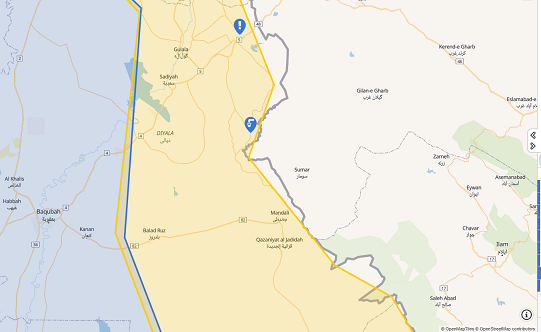1.4K
A weekly brief of events and news occurred in the disputed territories.
Kirkuk
- Iraqi army units issued an eviction notice to several Kurdish and Turkmen farmers in the village of Topzawa, ordering people to vacate their farmlands. The Ministry of Defense claimed legal ownership of the lands and plans to use it for military purposes. In 1987, the entire village of Topzawa was occupied by the former Iraqi regime, displacing the native Kurds and Turkmen from the areas. The village was a main site for a genocide agasint Kurds in 1990. On February 7, the acting governor of Kirkuk, Rakan al Jabouri, formed a committee and appointed the commander of the Joint Operations in Kirkuk to occupy Kurdish farmers’ lands. The leaked memorandum reads that the committee must return the land to Arab settlers based on a decision by Baghdad In 2021. In response to this decision, the General Executive Office has threatened to file a complaint against Rakan Jabbari. The Executive Office which implements courts’ rulings has informed al Jabouri that the enforcement of property is the responsibility of their office, not joint military operations. Last year, the Executive Office issued a decision reaffirming that “No side should interfere in the disputed lands that have been resolved within the framework of Article 140 [of the constitution] until the implementation of that article.” Separately, representatives of Kurdish parties met with the United Nations Assistance Mission for Iraq (UNAMI) in Kirkuk, presenting legal evidence about the violations of the Kirkuk administration and the Iraqi army. The documents included the Iraqi army’s occupation of Kurdish farmers’ lands, searching houses without court orders, removing Kurds from administrative positions and several other issues. Since October 16, 2017, the majority of Kirkuk’s population has struggled with the enforced military rule and Arabization policies.
- On February 15, Gharib Askar, a Turkmen lawmaker, issued a statement denouncing a statement by the Arab Council, describing it as “racist and chauvinistic terms” that would incite “ethnic conflict.” Askar, who is a Shitte Turkmen, reminded the council that the Daquq district faced “injustice, persecution, and the policy of systematic Arabization against the Turkmen and Kurd,” by the former Iraqi regime. On February 14, the Arab Council accused a number of Kurdish and Turkmen lawmakers of “obstructing” the appointment of Daquq’s mayor, who was appointed by the acting governor amid protests by Kurdish and Turkmen population. In recent weeks, the Kurds and Turkmen have united against the Arabization policies imposed by the administration on Kirkuk.
- On February 15, Shakhawan Abdullah, Deputy Speaker of Parliament, said that the Iraqi prime minister has formed a special committee to decide the fate of acting governors across Iraq. According to Abdullah, reports by the financial monitoring, the Integrity Commission, and parliament will help the committee determine the appropriate decision of action.
Khanaqin
- On February 15, police raided a house in the neighborhood of Hay Shorta and arrested two members of a family. According to a statement issued by the security mediacell, the two men were arrested based on intelligence information, and are members of the ISIS (Da’esh) terrorist organization.
- Iraqi Oil Minister Hayan Abdul Ghani has announced six new contracts to “develop” oil fields across the country, including in Naft Khana in Khanaqin. Three of the contracts were granted to a Chinese oil company while a company based in the UAE won the rest. The contracts include the development of the old fields as well as exploration and drilling of other oil fields and wells.
Shinga (Sinjar)
- Mohamma Khalil, a Yazidi lawmaker, announced that the Iraqi prime minister agreed to include the formation of a reconstruction fund for Shingal and the Nineveh Plains into the budget bill.
- On February 3, the construction of a cemetery and monument in Solagh, Shingal, officially began. Nadia Murad, founder and president of the Nadia Initiative, said during the ceremony, “Mourning is part of the healing process.” The project was launched in 2021 at the request of the Yazidi community and the Nadia Initiative, and began this week with the support of the International Organization for Migration in Iraq and United States Agency for International Development.

